Is Vitamin D A Winter Must-Have?
- Autumn Allen
- Feb 4, 2021
- 2 min read
Updated: Feb 11, 2021
Vitamin D is another nutrient that our body does not naturally produce so we must ensure we consume it to have it available for use by our cells. The interesting part about this vitamin is that it is actually a hormone.
Vitamin D is critical to our body's immune and inflammation responses. Studies have shown that Vitamin D deficiencies can lead to higher vulnerability for viral infections. Because one of the ways our body creates vitamin D is through the use of the sunlight, those of us living in states that have longer winter days are even more at risk and more susceptible to low Vitamin D during the winter months.
For those with more melanin in their skin or even using a high level of sun block during the winter months, these factors can decrease your body's ability to make vitamin D. So it is even more important that you are vigilant about consuming it as an additional supplement as part of your health diet and lifestyle.

Frequent Symptoms of Low Vitamin D
Members can follow each other, write and reply to comments and receive blog notifications. Each member gets their own personal profile page that they can customize. According to Biotics Research, just one of these symptoms could signal a vitamin D deficiency:
Mood changes
Fatigue
Muscle cramps
Body aches
Frequently falling
Bone fractures
How To Get More Vitamin D:
You can always purchase the Emulsion Vitamin D from Biotics Research that you can find in our online store here, or you can indulge in some of the below food items. Getting out in the sun is a great way to increase your vitamin D; however, it can be difficult for those who live in areas that see less sun in the winter months.

Foods Rich in Vitamin D
Oily fish such as Salmon & Tuna
Red Meat
Liver
Egg Yolks
Fortified foods such as milk or bread




Comments